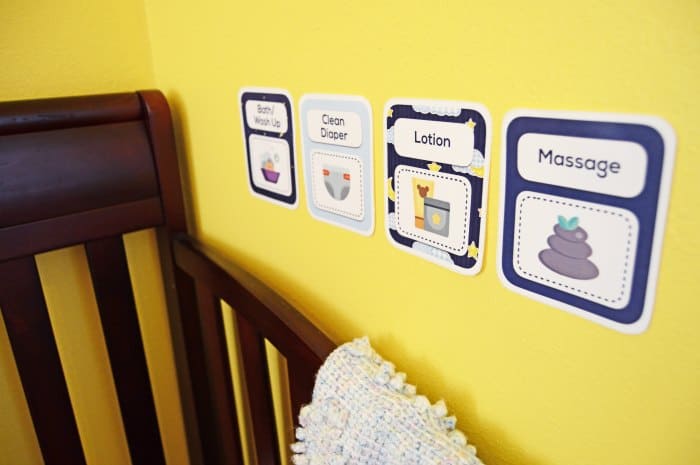If you ever find yourself wondering “Why do babies fight sleep?” you are not alone. You try all the baby sleep tips, and your baby still struggles to fall asleep when he is oh-so tired.
I remember taking care of my son in the first months of his life, and he was incredibly fussy.
Fighting sleep for naps and bedtime, he definitely did not sleep like a baby.
How to Stop Your Baby Fighting Sleep
So if you are like me and find yourself in a similar situation, here are a few tips to help your baby stop fighting sleep and start enjoying some much needed rest.

1. Over-tired.
Keeping a baby up in hopes of tiring him out will, unfortunately, result in the opposite effect. Babies who are overtired or overstimulated will sleep for shorter amounts of time and wake more frequently. Carefully watching for your baby’s sleep window will help you gauge how much awake time is right for your baby.
How exactly do I watch for the ‘sleep window?’
A baby’s sleeping cue may come in the form of an eye rub, a yawn, a fuss, or looking away. This is the signal that you’re baby entered the ‘sleep window.’
Keep your eyes peeled to determine what an appropriate wake time is for your child. After you know your baby’s approximate wake time, it can help you gauge when to set the stage for sleep.
Approximately how long should my baby stay awake?
Birth – 6 weeks: 45 – 60 minutes
2-3 months: 1 – 1.5 hours
4-5 months: 1.25 – 2.25 hours
6-7 months: 2 – 2. 75 hours
8-9 months: 2.25 – 3 hours
10-12 months: 3 – 4 hours
12+months: 3 – 6 hours depending on number of naps
2. Nap Times Are Too Short or Long.
Are you looking for a sleep schedule to guide your nap times?
I have a complete age-by-age guide with sample baby sleep schedules for you to use.
I also have a comprehensive Rhythms, Routines, and Schedules book with 20+ printable schedules that can help you find the right nap time schedule for your baby.
How to find a good nap routine:
3. New Developmental Milestone
If you are struggling with sleep, I highly recommend familiarizing yourself with The Wonder Weeks book and website.
All babies go through mental leaps (developmental milestones) at the same age markers. With each leap, you baby is learning new things, but this can also mean a fussy baby or a baby fighting sleep.
This is especially true around 6 months when babies experience a leap and separation anxiety can start.
According to the Wonder Weeks, the fear of strangers…
- … can start from the leap of relationships (6 months)
- … is at its peak between 8 and 18 months
- … can sometimes last until your child is 3 years’ old
4. Teeth and teething discomfort.
Of course teething is a common “go-to” reason experts like to use as blame for sleep disruptions. In my experience and based on other research, I think this is highly overused as a reason for sleep issues.
According to Bupa Dental, an individual tooth will usually only cause discomfort for a few days at most, but it can take longer for some babies.
5. Overstimulation leads to an overtired baby.
Babies are natural little learners, who want to explore and play and don’t want to miss anything.
As a parent, it’s often your initial instinct to fulfill that need for your baby.
Stimulating a baby is important, but it’s also important to do so in moderation.
Little babies become overstimulated very quickly with too much noise, colors and too much activity.
Beware of toys that light up and make noises. This is can quickly lead to overstimulation.
So just how much stimulation is too much?
Watch your baby’s sleep cues closely, if he starts to look away, engage in eye rubbing, yawn or fuss, it is likely time to decrease simulation.
If he is active and engaged, it’s likely okay to keep playing for a bit.
Often times, simply looking around at other people, listening to a nursery rhyme, or playing with a simple rattle is enough to stimulate a young baby.
6. Not taking full feedings.
Your baby might be feeling hungry during sleep and waking up prematurely due to snacking throughout the day.
The goal is to encourage your baby to take full feedings rather than snacking, and the best way to do that is to feed the baby right after he wakes from sleep.
It is often our initial instinct to feed a baby right before sleep, but in doing so, the baby is very likely to take a snack rather than a full feeding.
Right before sleep a baby is tired and lacks the energy to take a full meal, falling asleep at the bottle or breast.

How exactly do I keep the baby from eating before sleep?
The one thing you can do to fix that is to follow the eat, play, sleep cycle, in which the baby wakes from sleep and eats right away, then plays, then sleeps.
When a baby eats after waking from sleep, he will have the most energy to take a full feeding.
7. Swaddling – especially newborns.
Many parents avoid a swaddle because “their baby doesn’t like it.” While many babies fight swaddling, it doesn’t mean that they don’t appreciate being snuggled in a swaddle.
Remember, all babies spent 9 months snuggly swaddled a mother’s womb. Swaddling is familiar, safe and cozy.
All babies possess a startle reflex, in which they jerk themselves awake with startle-like movements up until 4-5 months of age.
Swaddling prevents your newborn from waking themselves up just after they fell asleep.
How do I know which swaddle is right for my baby?
As always, I recommend the HALO SleepSack Swaddle. It has Velcro to help keep a secure, snug, yet safe swaddle. It also enables the babies legs to move freely, preventing hip dysplasia, which is very important.
We started with the HALO Swaddle and then moved to their wearable blankets (which psst is a totally awesome way to keep your baby from climbing out of the crib!)
9. Light sleep.
Many babies fight sleep because they are unable to stay asleep during light sleep.
Unlike adults, babies sleep in 45 minute sleep cycles and can take up to 20 minutes to reach deep sleep.
Read: 8 Infant Sleep Facts Every Parent Should Know
So if your baby wakes 5-20 minutes after you lay him down, it’s simply because he couldn’t stay asleep during light sleep.
And if your baby wakes 45 minutes after falling asleep, it’s simply because he couldn’t transition from one sleep cycle to the next without waking up entirely.
10. Temperature and sleep environment.
If your baby is too hot or too cold, he might feel uncomfortable and fight sleep. Many experts warn not to overdress a young baby, and it’s important to note that.
How do I know if my baby’s temperature is just right?
The best thing you can do is what I like to call the “toe test.” When your baby wakes from sleep, remove his swaddle and/or socks and feel his toes. If they feel too hot or too cold, adjust your baby’s sleepwear or the temperature of your home slightly in order to meet his needs.
Using other things like using blackout curtains can help create an ideal sleep environment for your child to drift off to sleep more easily.
11. White noise.
Not everyone is a fan of white noise machine, but it works wonders in our home. It especially works wonders if your baby fights sleep due to sleep cycle or light sleep issues. Hearing a gentle humming in the room mimics the womb, in addition to minimizing background noise in the home when everyone else is awake.
What is the best thing to use for white noise?
A small fan in the room (not directly blowing on or near the baby) will do the trick. You don’t need anything fancy. This is the exact Honeywell Fan we use. Placed on medium, the fan sits across the room from our son’s crib on his dresser.
12. Sleep Routines.
Nearly all babies and children alike thrive on routine and predictable sleep patterns. The world is a chaotic place and routines create a safe predictability, in which a baby relies.
Routines help a baby learn what comes next in a series of events and what he needs to do as a participant in the routine. For example, if you establish a consistent sleep time routine, your baby will learn that a nap or bedtime follows at the end of the sleep routine. It will help him realize, “Oh, now it’s time for me to rest.”
How do I create a good bedtime routine?
The most important thing about a bedtime routine is that you are consistent. This means you do the same routine at the same time each and every night. Putting your baby on an approximate schedule and a good baby bedtime routine can work wonders.

Here’s how we do the bedtime routine in our home from 6 weeks old to present toddler years:
7:00 pm bath
7:15 massage, soft music, clean jammies
7:20 breast, bottle or sippy of milk (+small snack after 10-12 months old, usually cheese, crackers or fruit).
7:30 place in swaddle or wearable blanket, kisses, cuddles, say our sleepy words (I love you. I hope you have a good sleep and I will see you in the morning). Down for the night.
You can use these simple cards to help create a consistent routine.
Wrapping it up
Sleep is often a tricky situation to navigate and can sometimes take several weeks and months of consistency to lay a strong foundation that will last for years to come.
If you don’t see instant results, it doesn’t mean you are doing anything wrong.
It means your baby is completely normal and if you stick to your plan, it will continue to get better the more consistent you are.
Print your free baby sleep checklist!
Chances are…you won’t remember the tips from this post. This printable simplifies it! Plus, when you grab this printable, you’ll get instant access to my free 3-day baby sleep eCourse.

Download your free printable
- Download the checklist. You’ll get the printable straight to your inbox, plus get my Free 3-Day Baby Sleep eCourse!
- Print. Any paper will do the trick, but card stock would be ideal.
- Place it on your refrigerator. Use it as a quick reference and don’t forget a thing!
Want more on sleep?
- My Top 10 Newborn Baby Sleep Tips To Help You Get More Sleep
- The Newborn Routine That Will Help Your Baby Fall Asleep Faster
- Top 7 Challenges + Solutions for Parenting a Newborn and Toddler
- 8 Infant Sleep Facts Every Parent Should Know
Resources for sleep:
I've created a free email series just for you! If you are struggling with finding a routine, rhythm or schedule, this email series will help you find one that will work for YOUR family. Yes, really. I've seen my sample routines work time and time again for parents. I know it can work for you too.
This free email series will help you:
- Free sample routines for your child
- Best morning routine tips and tricks your kids will actually follow
- All-time favorite parenting hacks for getting more cooperation at bedtime
- Step-by-step guide for using a printable daily schedule with kids











Thanks for such a great article! Has great advice. We have a 3 week old and he definitely fights sleep. Seems to get overtired and arches his back and gets so angry. Usually he goes down within an hour or hour and a half. I know people say you should get them used to sleeping with noise but considering he fights sleep and can be woken easy at times should I put him down for a nap in a quiet room? I have been keeping him in living room with me with light tv noise and sometimes talking with my husband. Thanks so much!
My baby is 5 weeks old but seems to be tired all the time – I catch her yawning and rubbing her eyes (at which point I will try to get her to nap), otherwise she fall asleep on her own but towards the later part of the day (around 3-4pm or so) her naps will get more disrupted and she’ll probably wake up after, say, 30 min. What am I doing wrong? Is she supposed to be this sleepy all the time and should I just let her sleep for as long as possible during her naps (we always wake her up every three hours for her feed in the day though)?